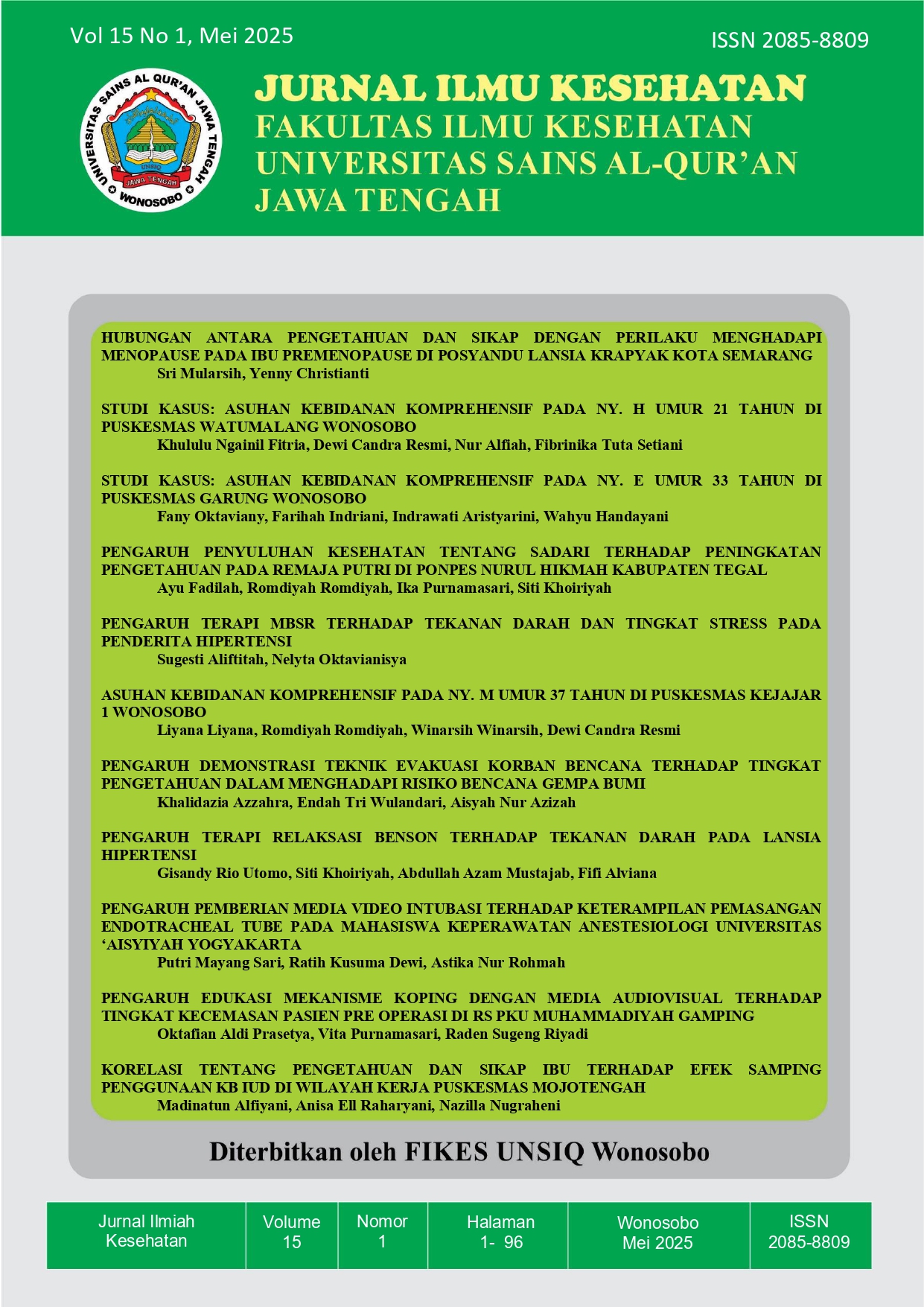KORELASI TENTANG PENGETAHUAN DAN SIKAP IBU TERHADAP EFEK SAMPING PENGGUNAAN KB IUD DI WILAYAH KERJA PUSKESMAS MOJOTENGAH
Main Article Content
Abstract
Background: The Intrauterine Device (IUD) is an effective and long-term contraceptive method. However, a lack of maternal knowledge regarding its benefits and side effects can influence attitudes, such as fear and doubt, which often arise due to inaccurate information. Objective: To determine the relationship between maternal knowledge and attitudes regarding the side effects of IUD contraceptive use in the Mojotengah Public Health Center work area. Method: This study used a quantitative method with a correlational analytic design and a cross-sectional approach. The sample consisted of 46 respondents who were active IUD users at Mojotengah Public Health Center, selected using a total sampling technique. Results: The majority of respondents had low knowledge (71.7%) but showed a positive attitude toward IUD use (65.2%). The Chi-Square test showed a significant relationship between maternal knowledge and attitudes regarding IUD side effects (p = 0.008; r = 0.981), indicating a very strong correlation. Conclusion: There is a significant and strong relationship between maternal knowledge and attitudes toward the side effects of IUD contraceptive use. It is recommended that healthcare providers enhance education for mothers about IUDs to improve understanding and foster more positive attitudes toward this contraceptive method.
Article Details
Section
References
Arum. (2017). Metode Kontrasepsi Sterilisas. Jakarta: Graha Ilmu.
Darsini, Fahrurrozi, & Cahyono, E. A. (2019). Pengetahuan; Artikel Review. Jurnal Keperawatan, 12(1), 95–107.
Fitriani, N. (2019). Pengetahuan Ibu Pus Tentang Alat Kontrasepsi Iud Di Wilayah Kerja Puskesmas Sukalaksana Kota Tasikmalaya Tahun 2019.
Hakiki, M., Kurniawati, I., & Hariyani, W. F. (2019). Efektifitas peran kader terhadap motivasi ibu mengikuti KB IUD di Desa Karangrejo Kecamatan Blimbingsari Kabupaten Banyuwangi Jawa Timur. Midwiferia: Jurnal Kebidanan, 5(2), 1–7. https://doi.org/10.21070/mid.v5i2.2766
Irawan, A., Sarniyati, & Friandi, R. (2022). Hubungan Pengetahuan Dengan Sikap Masyarakat Terhadap Penderita Skizofrenia Di Wilayah Kerja Puskesmas Kumun Tahun 2022. Prosiding, 1(2), 705–713.
Laoli, J., Lase, D., & Waruwu, S. (2022). Analisis hubungan sikap pribadi dan harmonisasi kerja pada Kantor Kecamatan Gunungsitoli Alo’oa Kota Gunungsitoli. Jurnal Ilmiah Simantek, 6(4), 147–148.
Kemenkes. (2021). Kontrasepsi Tepat Tingkatan Kesehatan Reproduksi. Https://Yankes.Kemkes.Go.Id/View_Artikel/1143/Kontrasepsi-Tepat-Tingkatkan-
Lestari, S., E. & W. D. (2024). Gambaran Pengetahuan Dan Sikap Ibu Akseptor Kb Terhadap Penggunaan Alat Kontrasepsi Iud Di Puskesmas Wonosamodro Kabupaten Boyolali.
Marsaoly, S., & Djama, N. T. (2022). Exploring factors affecting the mother's knowledge about Intrauterine Device (IUD) in Bastiong Karance District of Ternate City. International Journal of Advanced Health Science and Technology, 2(2), 69–73. https://doi.org/10.35882/ijahst.v2i2.3
Morse, J., Lally, R., Hirschhorn, L., Wainwright, D., & Luks, F. (2014). Decision-making about method use among women in Ghana: The role of communication. BMC Public Health, 14, 1231. https://doi.org/10.1186/1471-2458-14-1231
Nasution, C. I. (2019). Hubungan Pengetahuan Dan Sikap Dengan Tingkat Kecemasan Akseptor Kb Iud Di Wilayah Kerja Puskesmas Padang Matinggi Tahun 2019.
Pradila, S., & Khofiyah, N. (2022). Asuhan Kebidanan Dengan Akseptor Kb Iud Di Bantul. Buletin Ilmu Kebidanan Dan Keperawatan, 1(01), 1–7. Https://Doi.Org/10.56741/Bikk.V1i01.34
Purwaningrum, Y. (2017). Efek Samping Kb Iud (Nyeri Perut) Dengan Kelangsungan Penggunaan Kb Iud. Jurnal Kesehatan, 5(1), 45.
Radja, D. K., Sir, A. B., & Sinaga, M. (2024). IUD contraceptive use in couples of childbearing age: A qualitative study in Southwest Sumba. Media Kesehatan Masyarakat, 6(1), 33–43. https://doi.org/10.35508/mkm.
Rahayu, I., R. M., & U. E. (2018). Hubungan Pengetahuan Ibu Pasangan Usia Subur Dengan Penggunaan Kontrasepsi Iud Di Nagari Andalas Baruh Bukit Kecamatan Sungayang Kabupaten Tanah Datar. Jurnal Kesehatan Andalas, 44–47.
Setiati, N. W. (2019). Hubungan Pengetahuan Ibu Tentang Efek Samping Dengan Motivasi Penggunaan Iud Pada Pus (Pasangan Usia Subur) Di Desa Bendasari Kecamatan Sadananya Tahun 2017. Jurnal Keperawatan Galuh, 1(1), 37. https://doi.org/10.25157/jkg.v1i1.1788
Sukesih, S., Usman, U., Budi, S., & Sari, D. N. A. (2020). Pengetahuan Dan Sikap Mahasiswa Kesehatan Tentang Pencegahan Covid-19 Di Indonesia. Jurnal Ilmu Keperawatan Dan Kebidanan, 11(2), 258. https://doi.org/10.26751/jikk.v11i2.835
Yanti, E. R. (2022). Hubungan Antara Pengetahuan Akseptor Kb Iud Dengan Kecemasan Efek Samping Kontrasepsi Iud Di Bpm Sehat Sejahterah (Desa Parengan Kecamatan Plumpang) Oleh. 9, 356–363.
Sari, Y. N. I., Abidin, U. W., & S. N. (2019). Faktor-faktor yang berhubungan dengan minat ibu dalam pemilihan alat kontrasepsi IUD. Cendekia Medika, 5(1), 9–17. https://doi.org/10.52235/cendekiamedika.v7i1.109

